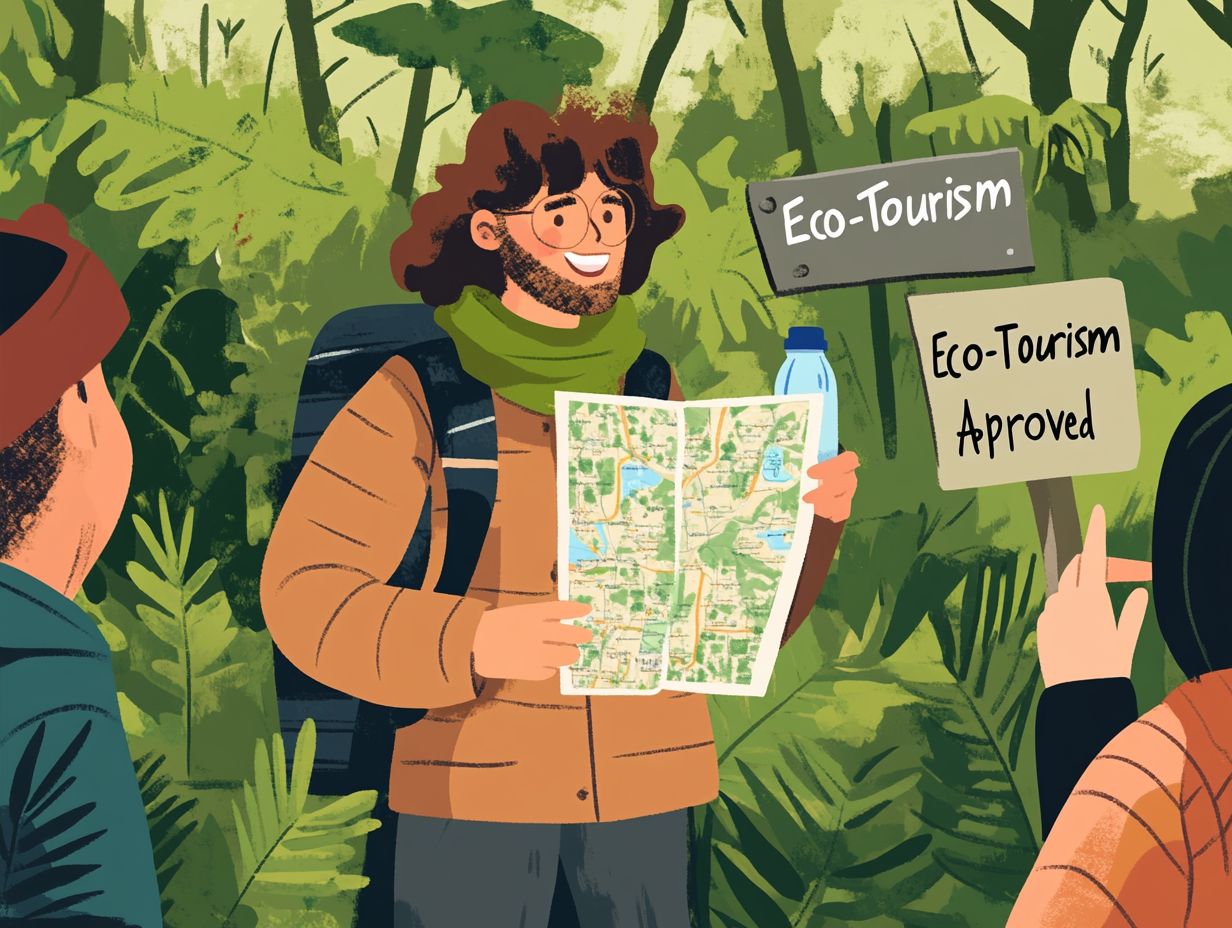How to Avoid Greenwashing in Travel?
In a time when eco-consciousness is becoming increasingly prevalent, it’s essential to recognize that the travel industry is not exempt from the pitfalls of greenwashing. Greenwashing means companies pretend to be more eco-friendly than they really are, often exaggerating or misrepresenting their environmental initiatives to appeal to travelers who care about the environment.
This article delves into the implications of greenwashing for travelers. It provides insights on how to identify misleading claims and offers practical advice for making informed choices.
Find genuine eco-friendly alternatives. Empower yourself with research to ensure your travels reflect your values.
Contents
- Key Takeaways:
- Understanding Greenwashing in Travel
- Signs of Greenwashing in the Travel Industry
- How to Avoid Falling for Greenwashing
- Eco-Friendly Alternatives in Travel
- The Importance of Research and Education
- Frequently Asked Questions
- What is greenwashing in travel?
- Why is it important to avoid greenwashing in travel?
- What are some common examples of greenwashing in travel?
- How can I identify and avoid greenwashing in travel?
- What should I look for in a truly sustainable travel experience?
- What can I do to support truly sustainable travel?
Key Takeaways:

- Watch out for greenwashing! Some companies lie about being eco-friendly just to make money.
- Look for vague or excessive green claims. Do thorough research before booking a trip.
- As a responsible traveler, choose eco-friendly options and support sustainable practices in the travel industry.
Understanding Greenwashing in Travel
Understanding greenwashing in travel is essential for you as a traveler who cares about the environment. You need to distinguish between genuine sustainable practices and the misleading claims of various tourism companies.
Greenwashing often appears as deceptive marketing tactics. Travel companies exaggerate their commitment to sustainability, complicating your ability to make informed choices.
As eco-tourism continues to rise, it s crucial to closely examine certifications and labels that claim to uphold environmental integrity.
Experts like Randy Durband and organizations such as the Global Sustainable Tourism Council emphasize the critical role of transparency in the tourism industry. This transparency illuminates the path for your responsible travel decisions.
Defining Greenwashing and Its Impact on Travel
Greenwashing refers to the deceptive marketing tactics used by travel companies that misrepresent their services as environmentally friendly. This can significantly undermine genuine sustainable travel efforts.
This misleading strategy capitalizes on the rising demand for eco-conscious travel, often presenting superficial or exaggerated claims about sustainability. To avoid this pitfall, it’s important to know how to identify sustainable travel spots. As a result, you may find yourself inadvertently supporting businesses that contribute to environmental degradation while searching for truly green options.
The tourism industry faces challenges due to this misrepresentation. It not only undermines the credibility of genuine sustainability initiatives but also complicates your choices as a traveler.
The widespread occurrence of greenwashing can obstruct meaningful progress in reducing carbon footprints. Companies engaging in these practices frequently neglect to implement substantial eco-friendly measures.
Signs of Greenwashing in the Travel Industry
Recognizing the signs of greenwashing in the travel industry is crucial for you as a consumer striving to support sustainable practices. The prevalence of misleading claims and dubious labels can create confusion among eco-conscious travelers like yourself.
By honing your ability to discern genuine sustainability efforts from mere marketing ploys, you can make informed choices that truly align with your values.
Act now to support real sustainability! Make your next travel decision count by learning how to book eco-friendly accommodations and choosing truly sustainable options.
Identifying Misleading Practices

Identifying misleading practices in the travel industry requires vigilance and attention to details that may indicate greenwashing. Watch for vague language or exaggerated claims about eco-friendly products.
Be cautious of companies making broad statements about sustainability without providing specific evidence or explanations. If a company talks about its commitment to environmental stewardship, ask how their practices support this claim.
Take time to examine promotional materials for certifications from credible third-party organizations. This can provide peace of mind. Look for clear reporting on sustainability efforts to strengthen your confidence in a company’s claims.
Engaging with social media communities that share insights and experiences can be beneficial. This helps you gather a broader perspective on companies that genuinely prioritize the environment over marketing strategies.
How to Avoid Falling for Greenwashing
Avoiding greenwashing means you need to do careful research and demand transparency from travel companies. This ensures their claimed sustainability practices align with responsible luxury and authentic eco-friendly initiatives.
Tips for Being a Responsible and Informed Traveler
Being a responsible traveler means prioritizing transparency in your travel choices, supporting local businesses, and committing to waste reduction and other sustainable practices.
This approach can enhance your travel experience and positively impact the places you visit. For example, choose accommodations that emphasize eco-friendly operations, like those using renewable energy and offering organic, locally sourced food. Additionally, consider incorporating top sustainable travel practices to further your commitment to responsible tourism.
Participating in community-based tourism allows you to immerse yourself in local cultures and directly support residents. Engaging with local artisans or guides enriches your journey and helps preserve traditional crafts and knowledge.
Embrace responsible luxury by staying in boutique hotels that maintain low occupancy to reduce their carbon footprint. This lets you enjoy comfort without compromising your environmental values.
Eco-Friendly Alternatives in Travel
Exploring eco-friendly alternatives in travel reveals a range of sustainable options for the environmentally-conscious traveler. You can find tourism companies committed to lowering their carbon footprints and using renewable energy sources.
Exploring Sustainable and Ethical Options

Exploring sustainable and ethical travel options elevates your experience while fostering community support. Engage meaningfully with local cultures and contribute to biodiversity preservation.
By choosing eco-resorts and participating in community-based tourism, you can minimize your ecological footprint while enjoying authentic interactions with local residents. This thoughtful approach encourages the protection of fragile ecosystems and supports practices that benefit both nature and the economy. For more tips, check out how to stay green while traveling abroad.
Sustainable accommodations often use renewable resources and create jobs, enhancing the livelihoods of local families. Supporting local artisans and farms enriches your experience and sustains traditional crafts, ensuring a vibrant cultural heritage for future generations.
The Importance of Research and Education
The importance of research and education in making informed travel choices is paramount. By understanding sustainability measures and examining the claims of various travel companies, you empower yourself to make eco-conscious choices that reflect your values.
Learn to Make Smart Choices
Making informed choices is crucial in promoting eco-friendly practices in travel. By understanding sustainable travel, you elevate your consumer awareness and make better decisions.
Diving into regional customs, local wildlife, and the environmental impact of activities cultivates a deeper appreciation for the destinations you visit. Research enables you to identify and support ethical tourism initiatives, including learning how to identify sustainable travel brands, ensuring your travel dollars contribute positively to the community and ecosystem.
Understanding sustainable transportation options and eco-conscious accommodations helps minimize your carbon footprint. This effort enriches your travels and fosters a culture of responsible travel, benefiting both people and the planet.
Frequently Asked Questions
What is greenwashing in travel?

Greenwashing in travel refers to companies exaggerating or falsely claiming their commitment to sustainability.
Why is it important to avoid greenwashing in travel?
Avoiding greenwashing is important because misleading claims can lead consumers to make choices that aren’t truly environmentally friendly, ultimately harming the environment.
What are some common examples of greenwashing in travel?
Common examples include using vague terms like “eco-friendly,” displaying eco-certifications without verification, or emphasizing minor sustainability efforts while ignoring larger environmental impacts. Misleading claims are frequent in the tourism industry.
How can I identify and avoid greenwashing in travel?
Research a company’s sustainability practices and certifications. Look for specific sustainability goals and consider their overall environmental impact, including their carbon footprint and any carbon offsets offered.
What should I look for in a truly sustainable travel experience?
A truly sustainable travel experience prioritizes conservation, supports local communities, and maintains transparent sustainability practices. Look for certifications like Green Globe, Rainforest Alliance, and those from the Global Sustainable Tourism Council.
What can I do to support truly sustainable travel?
Join the movement for sustainable travel today! Choose eco-friendly accommodations, participate in responsible tourism activities, and support local businesses that prioritize sustainability. Hold companies accountable for their sustainability claims, ensuring they adhere to social responsibility and environmental initiatives.






